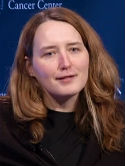| Abstract: |
Several models of physicianrpatient communication that have served as conceptual frameworks for communication skills training have been described over recent years. Studies have explored the efficacy of such training in altering physician behaviours. This chapter reviews these models and examines their strengths and weaknesses. It then focuses on a new model of communication skills training, the Comskil model, which was developed at the Memorial Sloan-Kettering Cancer Center in an effort to address critiques of these earlier models. A review of the literature indicates six established models of physicianrpatient communication that have served theoretically to guide communication skills training programmes: the Bayer Institute for Healthcare Communication E4 Model; the Three-Function Model/ Brown Interview Checklist; the Calgary-Cambridge Observation Guide; the Patient-Centred Clinical Method; the SEGUE Framework for Teaching and Assessing Communication Skills; and the Four Habits Model. For each of these, the conceptualisation of the model is first summarised and then the way in which its application is assessed is discussed. |



